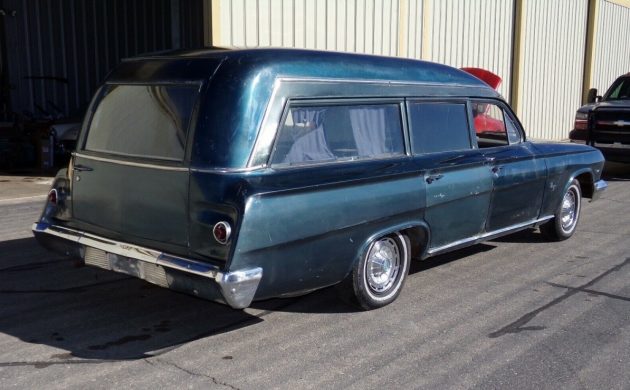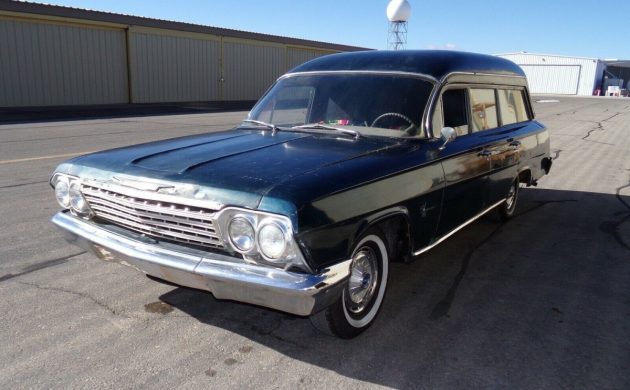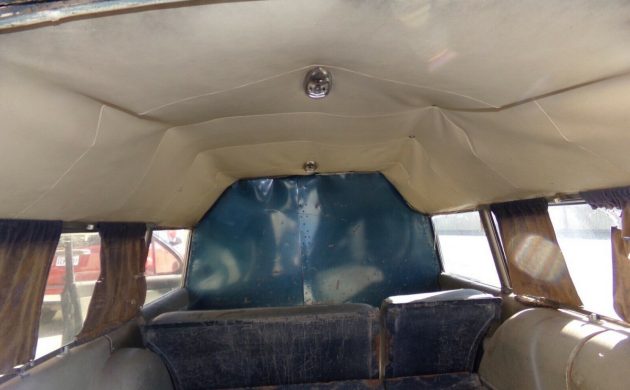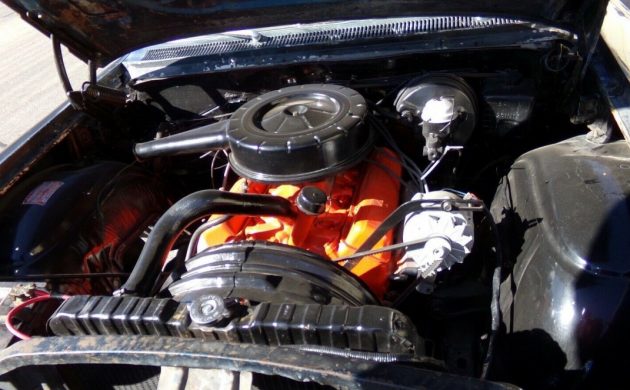General Motors has long served as a source of automobiles for coachbuilders to transform into ambulances and hearses. One such coachbuilder was Arkansas-based Cotner-Bevington, and this 1962 Chevy Impala was one of its outputs. Until recently, this converted hearse has lived and worked in Mexico, but it’s now back in Texas and looking for a new owner. Located in El Paso, this aging transport is available here on eBay for $9,900. That’s the Buy It Now price, but the seller will entertain offers.
Cotner-Bevington Corporation was formed in Blytheville, Arkansas in 1959. It was a spin-off of the Comet Coach Co. after Comet sold its name to Ford for their upcoming new compact car. In its earlier days, Cotner-Bevington was more of a small conversion firm than a professional car builder. They specialized in working with Oldsmobile’s, but they also built several Buick and Chevrolet coaches through 1962. GM would supply the company with kits made up of unfinished bodies, cowls, and chassis. They then stretched the wheelbases and equipped them with commercial (extra-high) side glass and modified sheet metal. The company was sold in 1965 and the name disappeared after 1975.
As the story goes, after this hearse spent six years in service in the U.S. and was then sold to a funeral home in Guaymas Sonora, Mexico. It was there from 1968-21 and just recently crossed back over the border into the States. The hearse has been repainted several times and is wearing dark green now, although we assume it was black, to begin with. Rust can be found in several places, and we don’t know how extensive those repairs will be. There is the occasional ding such as in the front of the hood. The chrome pieces are okay, but far from perfect. And even though the hearse is based on an Impala, just one set of taillights is used.
While in Mexico a steel divider was welded in behind the front seat, so legroom afforded anyone riding in the back seat would be little. The upholstery is rather tired, and a multi-colored blanket covers the front seat, probably because the material is in poor condition. Part of the dashboard was cut to remove the radio and the seller does not mention if the Chevy runs. What appears to be a freshly repainted V8 is under the hood, perhaps a 327 paired with a Powerglide automatic. If you were to buy this vehicle, what would you do with it? Do a total restoration and put it back into service as a vintage hearse or turn it into a promotional car of some sort.








Ya gotta wonder about the steel plate.
I’ll venture it’s two possibilities
1. In the event of a fast stop, keep the “passenger” from ending up in the front seat.
2. Perhaps some of the “passengers” might have had some bad odors associated. Yeah, gross, I know.
That’s not an Impala, that conversion was built using a base model Biscayne wagon. Also, it appears to be a 283, not a 327. The front fender “V”s, without cross flags above them, indicate that it started life with a 283. The Chevrolet script valve covers, are also signs of a 283.
I love 62 Chevys, and usually like ambulance/hearse/flower car conversions, but the roof and backdoor of this conversion, just looks really awkward to me.
I’m surprised it isn’t equipped with hydraulics yet and slammed to the ground.
Indeed, the ’62 Chevy is an iconic and coveted model for classic Lowrider builds. Someone should tip off Dave Parley or Rafael Reyes of self-described “Cholo Goth” band Prayers, seems this could be right up their alley.
The ideal smuggler’s vehicle. Who’s gonna stop it?
I find using a hearse for anything but funerals, to be disrespectful. This should either be in use, in a museum, or crushed. Is see too many of these turned into hideous attention getters for small minds and it saddens me.
Amen. Surprised we haven’t seen converted Iron lungs on the Salt flats.
I don’t think that people who rod old hearses are bad people per say, just lacking in empathy. Perhaps they have never lost anyone they care about due to young age or good luck. Not to come off as some crazy left winger (I am not) but I think it would do us all some good if more people thought about other peoples feelings a little more.
Price is a bit stiff…
What a great remark .
I’m with Gary , Throw that P.O.S. In the Trash or use it for Low Rider Funerals… 520 14” Tires , Wire Wheels , Air Ride and a nice Paint Job … I would like my last Ride In It . Lol
By the looks of the scratch marks on the back of the rear seat, an awful lot of people made 1-way trips in this thing!
Love the color. Weird that it has rear seats. I don’t think a casket would fit with the seats up. It should be taken to car shows as an oddity. I’d scope out how it was made if I saw it in person.
I like it.
I can now say i have seen heard everything though as what in tarnation is the logic to support owning and using a vehicle that once hauled dead arse as being disrespect?
Good night, im tired of that stuff.
As a hearse and ambulance enthusiast since my early teens, and from owning more than a few rare hearse and ambulances, I am fairly familiar with the more odd-ball versions.
I suspect this may have been intended as a service or ‘first removal’ vehicle, and since it has no casket rollers or bier pins to keep a casket from moving, I suspect that this was used as a service car, typically used to pick up bodies from the place of death using a wheeled gurney [back then most people died at home], and also to transport graveside equipment like the folding chairs for family members, and flowers to decorate the area around the actual grave. If they were using it for this purpose most of the time, it would make sense to have the partition installed. I had a 1956 Pontiac service car, it looked like a hearse, but had a solid partition between the front seat area and the rear area, and no casket rollers.
The other reason I don’t believe this was built for use as a hearse, is the fact this car was built on the standard Chevrolet wheelbase and suspension. The only custom part of the body is the roof and rear door area. The typical US casket length and weight would be too big and heavy for the standard Chevrolet wagon. Perhaps Mexican funerals in the 1960s used a more simple wooden coffin that was shorter and half the weight of the typical American Casket. If that’s the case, this would make sense using it as a hearse, except it doesn’t have any rollers or pins on the load floor.
In any case, this is probably the only surviving example of a rare coachbuilt Chevrolet, and deserves to be saved. The first thing that’s got to go is that damn partition and the rotting curtains! If it was mine, the next thing to do is find an early 60s Chevy or Pontiac 9 seat wagon, and put the 3rd row seat into this one, because now that it’s not got the tailgate, it’s easier to get in & out of the 3rd row seat! Then sell it to a car collector with a big family!